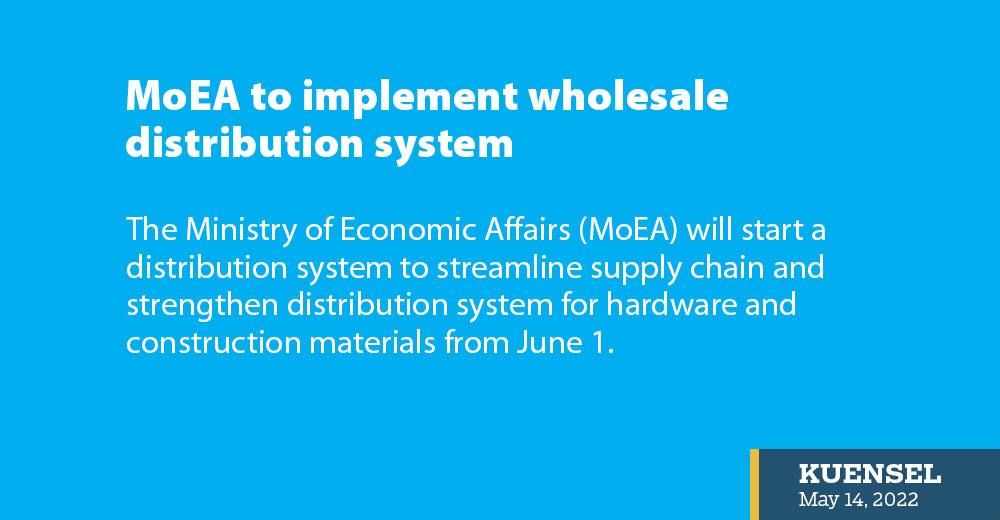Dechen Dolkar
The Ministry of Economic Affairs (MoEA) will start a distribution system to streamline supply chain and strengthen distribution system for hardware and construction materials from June 1.
The reform is aimed to streamline and strengthen the existing distribution system and ensure that quality products are available at fair and competitive prices in the market.
Department of Trade’s chief trade officer, Rinchen Lhazom, said most of the products available in the domestic market today are randomly sourced from open markets. “Such trends limit benefits from the favourable tax regime and other benefits and privileges offered by principal companies.”
She said reforming the distribution system would meaningfully benefit consumers and society at large. “The ministry is starting with a product-based distribution system for three hardware products of electric wires, electric cables and pipes in Thimphu, Paro and Chukha.”
The ministry in a press release stated that in order to ensure smooth transition and minimal disruption to the market and supply chain, three months transition period would be granted for the remaining 17 dzongkhags from June to August to strengthen and establish a formal distribution network for the hardware sector.
Rinchen Lhazom said that there are already wholesalers who are dealing in such products and distributing.
“We are currently limiting to three dzongkhags as other dzongkhags have either single-player or no wholesalers distributing those products. We have announced a three months period to allow private traders to come forward to apply for distributorship license,” she said. “There is no criteria to select the wholesalers.”
The list of licensed wholesalers and principal companies is open for expansion based on market scenario and distribution network for hardware sector.
According to the ministry, Thimphu has 14, Chukha two and Paro has one wholesaler.
Currently, the ministry has chosen 17 principal companies a approved by Bhutan Standard Bureau.
The ministry has also convened several rounds of consultation and sensitisation with private sector and relevant stakeholders.
The interim president of Bhutan Hardware Association, Thinley Dorji, said hardware shops buy from different companies in India. “If distribution system works as planned and if the government monitors regularly, it will benefit both wholesalers and retailers with authentic products,” the interim president said.
However, he said that if some of the projects and individuals import directly from the companies, it may impact the wholesalers and retailers.
He said that there won’t be much price difference if they buy from wholesalers. “In fact, it will be cheaper in Bhutan as compared to India due to the 7 percent Indian goods and service tax (GST).”
The manager of Sangay enterprise, Yonten Dema, said that although they don’t have to pay transportation and freight charges, they are worried that they may not be able to get the price that they used to get from the companies.
“We used to get a discount from the company and be able to sell at a marginal price to customers,” she said. “Now, we are worried that we may not be able to sell at a marginal price.”


